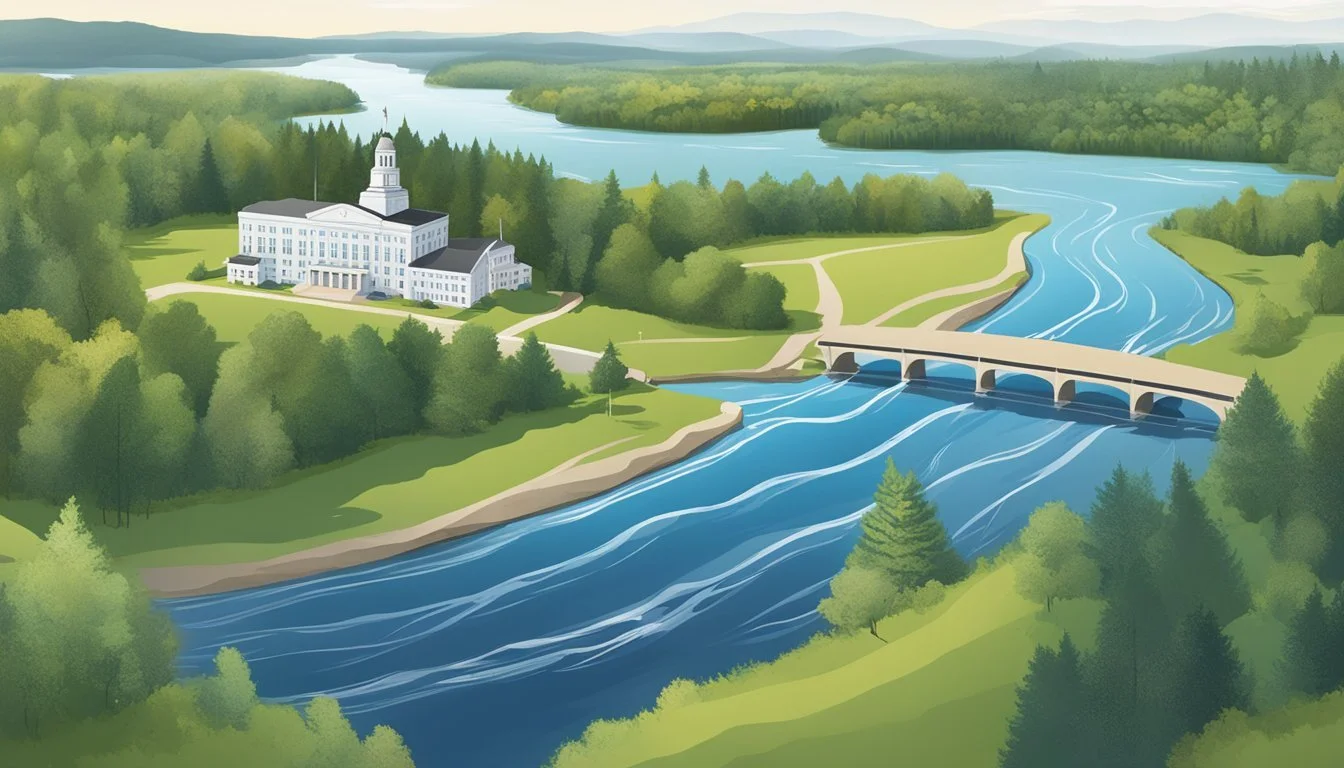Water Rights in Maine
Understanding State Regulations and Access Policies
Water rights in Maine encompass a complex set of laws and regulations aimed at ensuring fair and sustainable use of the state's water resources. The Maine Department of Environmental Protection plays a critical role in overseeing these laws to protect the state's vast aquatic environments. Maine's legal framework includes provisions for ground water rights and policies that address the planning and consultation on wastewater disposal, maintaining a balance between environmental stewardship and the needs of communities.
An understanding of Maine's water rights is essential, especially considering the state's diverse categories of water bodies, such as tidal waters, great ponds, and navigable rivers. These classifications are critical when it comes to ownership and rights, as legal entitlements and responsibilities vary significantly from one category to another. For instance, there have been instances where local water districts have the authority to manage the water supply to prioritize local consumers over commercial extraction efforts.
In recent years, debates over these rights have become more prevalent, with various stakeholders, including Native American tribes, advocating for recognition and enforcement of their water-related interests. The Penobscot Nation, for example, has been active in asserting its water rights, particularly over who has the power to regulate water quality on their ancestral lands. These discussions underscore the evolving nature of water rights in Maine as the state confronts environmental, legal, and community challenges.
History of Water Rights in Maine
The history of water rights in Maine is rooted in common law principles and shaped by interactions with the Penobscot Nation, evolving legislation, and judicial decisions that inform the state's current water policies.
Origins of Water Law
Maine's early water law reflects the riparian doctrine, where landowners adjacent to water bodies have the right to make reasonable use of the water, as long as it does not interfere substantially with the rights of other users. This principle was evident in the landmark case of Bailey v. Rust (1839), which set a precedent for equal right to water use among mill owners.
Penobscot Nation and Water Rights
The relationship between the state and the Penobscot Nation has significantly influenced water rights discourse in Maine. Traditionally, the Penobscot have held a deeply integrated spiritual and physical connection to the Penobscot River, and they have fought for the recognition of water rights within their territory. Disputes have often centered on the state's interpretation of treaties and federal laws compared to the Nation's claims, leading to complex litigation over navigational sovereignty and fishing rights.
Development of Modern Water Legislation
In response to water pollution and competing interests, Maine's Legislature enacted the Clean Water Act, influenced by Maine Senator Edmund Muskie's environmental advocacy. This legislation and subsequent amendments have improved pollution control and set industry standards. Additionally, the Maine Department of Environmental Protection (DEP) has developed comprehensive laws and programs to monitor and manage water quality.
Court decisions have also refined the application of water law, balancing public interest, environmental protection, and private rights. They play a critical role in the interpretation and enforcement of water statutes, thereby shaping Maine's approach to safeguarding its water resources.
Water Quality and Environmental Concerns
Maintaining high water quality standards and preserving Maine's freshwater ecosystems are pivotal. State agencies put forth environmental programs and regulations to combat pollution and protect aquatic life.
Pollution Prevention Efforts
Maine employs various strategies to prevent water pollution, including the Ground Water Protection Program and the Nonpoint Source Pollution Program. These initiatives are critical in safeguarding against contaminants entering water bodies. Notably, the Nonpoint Source Pollution Program targets pollution that originates from diffuse sources, such as agricultural runoff or urban stormwater, placing emphasis on Pollution Prevention through education and community involvement.
Water Quality Programs
The Maine Department of Environmental Protection oversees water quality programs under both the federal Clean Water Act and state law. These programs are fundamental in managing and enhancing the quality of Maine's water resources. Through voluntary, regulatory, and educational approaches, they work towards maintaining standards that ensure safe, clean water for both consumption and preserving the natural habitats of various species of fish and other aquatic organisms.
Impact on Freshwater Ecosystems
The health of freshwater ecosystems is a reflection of the overall water quality. Robust water quality programs lead to diverse and thriving freshwater habitats, where fish and other aquatic life can flourish. Continuous efforts to protect water quality directly contribute to the preservation of these ecosystems, highlighting the interconnectedness of environmental health and regulatory measures.
Legislation and Regulatory Framework
Maine's water rights and regulatory framework are outlined through a collection of laws and programs, each with specific objectives aimed at protecting and managing the state's water resources. These laws and corresponding regulations develop standards for water quality, outline criteria for various water bodies, and set forth mechanisms for the reporting and monitoring of water use.
Natural Resources Protection Act
The Natural Resources Protection Act (NRPA), under Title 38 of the Maine Revised Statutes, serves as a cornerstone in Maine's environmental legislation. It is designed to oversee the direct and cumulative effects of human activities on the state's natural resources, with a focus on wetlands, significant wildlife habitats, sand dunes, and other critical areas. The NRPA establishes that real estate developers and other parties must obtain permits before proceeding with activities that could potentially affect these protected natural resources.
Performance Standards and Zoning Laws
Shoreland Zoning requirements play a crucial role in maintaining water quality and ecosystems by regulating land use activities near the state's waterbodies. Local municipalities are charged with enforcing these zoning laws, which include buffer zones, land use restrictions, and vegetation clearances to protect water sources from pollution. Additionally, the Environmental Protection Board, with input from legislators, oversees these performance standards to ensure the protection and improvement of waters through the statewide Water Classification Program.
Water Withdrawal and Reporting
The Water Withdrawal Reporting Program is managed by the Maine Department of Environmental Protection and requires certain users to report both the volume and frequency of water withdrawal. This program is a key component in the sustainable management of Maine's water resources. It ensures that the cumulative impact of withdrawals on the aquatic ecosystem and hydrology is continually assessed, enabling informed decisions regarding water resource allocation, and maintaining a balance between usage and conservation.
Each of these aspects — the NRPA, shoreland zoning, and the water withdrawal reporting system — represents integral parts of Maine's concerted efforts to safeguard its precious aquatic environments for the benefit of current and future generations.
Water Rights Debates and Legal Challenges
Water rights in Maine have become a contentious subject, with debates intensifying over bottled water extraction, indigenous claims, and the role of private equity in resource management. The balance between economic interests and environmental stewardship is constantly being negotiated through legal channels and public discourse.
Bottled Water Controversies
Poland Spring, a major bottled water brand, has faced opposition due to its water extraction practices in Maine. Concerns have been raised over the potential for pollution and depletion of local water tables. One Rock Capital, a private equity firm that acquired Poland Spring, is at the center of a debate on whether large-scale water extraction by a single entity should be constrained to protect public resources.
Tribal Water Rights and the Penobscot Case
The Penobscot Nation has been advocating for the recognition of water rights in a case that underscores the historical challenges of tribal water sovereignty. The Penobscot Nation Tribal Ambassador has been vocal in the opposition to practices that may threaten the integrity of water resources, upholding that water is a cultural and economic lifeline for the tribe.
Private Equity Firms and Water Rights
Private equity's interest in natural resources has led to increased discourse on the role these firms play in water rights. Their involvement often signals a rally for greater returns on investment but raises alarms about long-term resource management, especially when threats to the sustainability of water resources are considered. Stakeholders are grappling with the question of how to regulate these entities to safeguard Maine's water for future generations.
Water Rights Advocacy and Community Action
Water rights in Maine have become a point of contention and mobilization, with advocacy groups and community members rallying together for the protection and equitable distribution of water resources. The efforts encompass legal challenges, educational outreach, and direct action.
Community Water Justice Initiatives
Community groups such as Community Water Justice have emerged in Maine to challenge instances of water privatization and to advocate for the sustainable and fair management of water. They seek to ensure that all communities, especially future generations, have access to clean and safe water. The Penobscot People, alongside neighbors and friends, are often integral in these grassroot campaigns, working to protect their ancestral waters from exploitation and to maintain their sovereign rights to water.
Role of Non-Governmental Organizations
Non-governmental organizations (NGOs) play a crucial role in advocacy, research, and legal support. For instance, Maine's Community Action Works argues for the basic right to clean water, standing in opposition to multinational corporations like Nestlé, which has faced criticism over its business practices related to water extraction. These NGOs are pivotal in empowering local residents and providing them with the tools needed to safeguard their water rights.
Public Rallies and Awareness Campaigns
Public rallies and awareness campaigns are vital in amplifying the voice of communities. Advocates like Nickie Sekera, co-founder of Community Water Justice, have led initiatives to raise awareness through community engagement and rally support. By educating residents about both local and global water issues, these campaigns aim to bring about tangible changes in policy and practice that reflect the community’s interests in environmental justice and inclusion.
Management and Protection of Water Sources
Maine's approach to water rights encompasses the protection of its vast array of water sources, from the clear groundwater reservoirs to the rich marine environments, ensuring each source is managed for sustainability and restored from any impairments.
Groundwater Management
In Maine, Groundwater Protection Program is a framework established to oversee and safeguard the quality of the state's groundwater. Strategies include the conduct of meticulous research and the enforcement of standards geared toward preventing contamination. This program acknowledges the indispensable role of groundwater in maintaining public health and supporting wildlife, as well as its intersection with property rights and state interests.
Protection of Marine Environments
The Marine Environmental Monitoring Program marks Maine's commitment to its marine waters, focusing on monitoring and collecting data to ensure the vitality of these ecosystems. This pertains to the regular issuance of reports that guide the conservation efforts for the marine life dependent on these waters, aimed at sustaining fisheries and protecting coastal habitats.
Restoration of Damaged Water Sources
The restoration of water sources in Maine that have sustained damage is an ongoing priority, with strategies in place to address both nonpoint source pollution and other detrimental impacts. Legislative authority confers upon municipalities and utilities the ability to take necessary steps to protect public water sources, finding a balance between environmental recovery and community water needs. This balance is vital not only for the current population but for the preservation of Maine's natural legacy.
Water Usage and Access
In Maine, water rights and access influence various facets of life from domestic needs to economic activities. Laws and regulations regarding water utilize both state and federal guidelines to ensure sustainable usage while protecting the environment.
Residential and Commercial Use
Residential and commercial entities are governed by Maine's water laws to ensure that groundwater quality is not compromised and that water rights are respected. The Maine Department of Environmental Protection oversees this, setting out clear stipulations like those stated in the Water Laws, which include program implementation and cooperation with agencies. Properties equipped with wells must abide by beneficial domestic use standards, employing groundwater for essential household purposes, under direct oversight of relevant health departments.
Commercial interests, particularly water utilities, must adhere to service standards as amended by state regulations. These standards, which can be found in Chapter 620 of the Service Standards for Water Utilities, dictate terms and conditions of water use, ensuring that the provision meets health and safety benchmarks decided in coordination with the Maine Center for Disease Control & Prevention.
Agricultural Demands and Water Access
Agricultural use of water in Maine must be carefully managed to balance the needs of farmers with environmental conservation efforts. Water access for irrigation is critical for crop production, yet it must comply with statewide conservation efforts and performance standards for excavations to sustain natural groundwater levels. Agricultural contracts often emphasize responsible water use to preserve this delicate ecosystem.
Sustenance Fishing and Cultural Significance
Maine recognizes the cultural significance and the rights related to sustenance fishing—a practice deeply rooted within local communities. Bodies of water that border properties grant riparian rights to property owners, which includes reasonable use of water for sustenance fishing, as noted in Water Law in Maine. The practice must also consider environmental impacts and adhere to regulations set forth by the Department of Health and Human Services to maintain both public health and traditional activities.
Future Challenges and Policy Directions
In Maine, the sustainable management of water resources faces evolving challenges that demand proactive policy responses. These responses must consider the climate's impact, emerging pollutants, and the need to modernize water rights.
Anticipating Climate Change Impacts
Climate change looms as a significant threat to Maine's water resources. It is anticipated to cause more intense weather events, sea-level rise, and temperature fluctuations. These changes impact the whole state, including its coast. Legislators in Maine must craft comprehensive plans that protect water resources from these impacts, ensuring they remain life-giving resources for future generations. Actions proposed involve updating floodplain maps and developing strategic responses that safeguard both inland and coastal communities.
Addressing New Pollution Threats
New pollution threats are continually emerging, from pharmaceuticals to microplastics, posing risks to Maine's precious water resources. Ensuring water quality involves strict enforcement of regulations and supporting legislation that curbs the introduction of new contaminants. These legislation strategies must address pollutants from both local and non-local sources, securing the wellbeing of tribal communities and the entire state's population.
Adapting Water Rights to a Changing World
As Maine adapts to a changing environment, it must also reassess its long-standing principle of "absolute dominion" over groundwater usage. Tribal communities have unique water rights that need integration into state plans. The adaptation of water rights in Maine not only involves proposed action on the local level but might also align with broader federal water policies. This legislation would better reflect the sentiment that water is life, necessitating a careful balance between development and sustainability. The state's policy direction may revolve around crafting water rights that are responsive to both current and future needs — accounting for environmental, societal, and economic variables.
Frequently Asked Questions
Water rights in Maine encompass a range of regulations and standards, from the ownership of waterfront property to the impact of federal acts on local water resources. Understanding these nuances is crucial for both property owners and the general public.
What are the regulations for waterfront property ownership in Maine?
In Maine, waterfront property ownership is governed by the "common law" tradition, allowing reasonable use of water for those who own land along the waterbody. Property owners should be aware of their boundaries and any local zoning ordinances that may apply.
How does the Clean Water Act affect water rights in Maine?
The Clean Water Act plays a significant role in Maine water rights by setting the framework for regulating pollutant discharges into waterways and maintaining water quality standards. It tasks state agencies with enforcement and compliance, affecting how individuals and businesses interact with water bodies.
What are the drinking water quality standards in Maine?
Drinking water quality in Maine must meet standards set by both the state and the Environmental Protection Agency. The Maine Drinking Water Program, part of the Maine CDC, provides resources on testing requirements and accredited laboratories.
How is water usage governed by riparian rights in Maine?
Riparian rights in Maine entitle landowners adjacent to a water course the use of water for domestic purposes. They must use water in a manner that does not significantly alter flow, level, or water quality and respects the rights of downstream users.
What are the legal disputes associated with water rights and property lines in Maine?
Legal disputes over water rights and property lines in Maine often arise due to misconceptions about ownership extents, usage, and access. Discrepancies between deeded property lines and actual use of water resources can lead to conflicts that may require legal resolution.
How are water bodies such as streams and lakes regulated in Maine?
Streams, lakes, and all navigable waters in Maine are subject to regulations under state law, including the Natural Resources Protection Act. This regulation ensures that activities like construction, dredging, and filling are conducted in a manner that protects the water quality and resource value.








